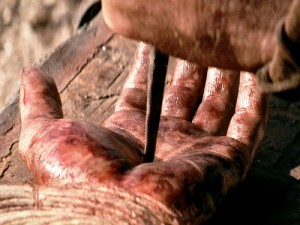21. Carried Our Sorrows

Surely our griefs He Himself bore, and our sorrows He carried; yet we ourselves esteemed Him stricken, smitten of God, and afflicted. But He was pierced through for our transgressions, He was crushed for our iniquities; the chastening for our well-being fell upon Him, and by His scourging we are healed. (Isaiah 53:4-5)
Sorrows are not sins. And these were not carried away. These are the burdens that Christ is willing to carry for us even now. He has paid for our sins, they are gone and buried. Christ has taken them away. But the pain in this life, the grief we endure, the sorrows of living in a fallen world, and sharing in His sufferings, these are the things—and more—He willingly carries.
Come to Me, all who are weary and heavy-laden, and I will give you rest. Take My yoke upon you and learn from Me, for I am gentle and humble in heart, and you will find rest for your souls. For My yoke is easy and My burden is light. (Matthew 11:28-30)
Cast your burden upon the LORD and He will sustain you; He will never allow the righteous to be shaken. (Psalm 55:22)
“Comfort, O comfort My people,” says your God. “Speak kindly to Jerusalem; and call out to her, that her warfare has ended, that her iniquity has been removed, that she has received of the LORD’S hand double for all her sins. ( Isaiah 40:1-2)
For thus says the LORD, “Behold, I extend peace to her like a river, and the glory of the nations like an overflowing stream; and you will be nursed, you will be carried on the hip and fondled on the knees. As one whom his mother comforts, so I will comfort you; and you will be comforted in Jerusalem.” Then you will see this, and your heart will be glad, and your bones will flourish like the new grass; and the hand of the LORD will be made known to His servants. ( Isaiah 66:12-14)
Blessed be the God and Father of our Lord Jesus Christ, the Father of mercies and God of all comfort, Who comforts us in all our affliction so that we will be able to comfort those who are in any affliction with the comfort with which we ourselves are comforted by God. For just as the sufferings of Christ are ours in abundance, so also our comfort is abundant through Christ. ( 2 Corinthians 1:3-5)
So what happens when we cast off our burdens to the LORD? He gives us His comfort. And wouldn’t you rather carry His comfort. Now I know we will always have trials and troubles in this life; but we do not endure them alone; His comfort is right there with us. But we are not just recipients of this comforting and burden bearing work Christ has done for us and in us. Paul reveals we are also to comfort others the way we are comforted. Those who have received must give.
Implied within the Hebrew carried, is carrying a heavy load, to the point of having to drag oneself along. Sorrows can be overwhelming, and Jesus is willing to carry them for you.
This is the second of the substitutions: He carried (drug) our heavy load of sorrows.



